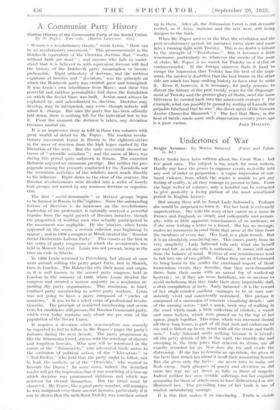A Communist. Party History
" WITHOUT a revolutionary theory," wrote Lenin, " there can be no revolutionary movement." This pronouncement is the Bolshevik equivalent of the Christian doctrine that " works without faith are dead " ; and anyone who fails to under- stand that it is believed in with equivalent fervour will find the history of the BoLshevik party meaningless or incom- prehensible. Rigid orthodoxy of doctrine, and the ruthless expulsion of heretics and." deviators," was the principle on which the Bolshevik party was created, grew and triumphed. It was Lenin's own inheritance from Marx ; and these two powerful and ruthless personalities laid down the foundation on which the Soviet State was built. Action must always be explained by, and subordinated to,. doctrine. Doctrine may develop, may be interpreted, may even—though nobody will admit it—change. But once the party line has been officially laid down, there is nothing left for the individual but to toe it. From the moment the decision is taken, any deviation becomes mortal sin.
It is an impressive story as told in these two volumes with great wealth of detail by Mr. Popov. The modern revolu- tionary movement began in Russia in the eighteen-sixties in the wave of reaction , from the high hopes excited by the liberation of the serfs. But the early movement showed no traces of " scientific socialism " ; and the name of Marx was during this period quite unknown in Russia. The anarchist Bakunin enjoyed an enormous prestige. But neither the pro- paganda among the peasants conducted by the Narodniks nor the terroristic activities of the nihilists owed , much directly to his influence. Right down to the close of the century, the Russian revolutionaries were divided into a series of loosely knit groups, not united by any common doctrine or organisa- tion.
The first " social-democratic " or Marxist groups began to be formed in Russia in thes'eighties. Since the outstanding feature of Marxism is its insistence on the revolutionary leadership of the proletariat, it naturally received a powerful impulse from the rapid growth of Russian industry, though the proportion of working men who actually participated in the movement was negligible. 'By the 'nineties, when Lenin appeared on the scene, a certain cohesion was beginning to, appear ; and in 1898 a congress at Minsk created the " Russian Social-Democratic Labour Party." This counts as the first in the series of party congresses of which the seventeenth was held in Moscow last year. Lenin was not present, being at the time an exile in Siberia.
In 1900 Lenin returned to Petersburg, but almost at once went abroad, editing the party paper Iskra, first in Munich, then in London. The Bolsheviks owe their namo and origin, as it is well known, to the second party congress, held in London in the summer of 1903, ,where Lenin divided the congress and secured a narrow majority on a resolution re- garding the party organisation. This resolution, in brief, confined party membership to .active party .workers, Lenin was not going to' have a party composed of -" circles of amateurs." It was to be a select corps of professional revolu- tionaries. The 'Principle of restricted membership and severe tests for candidates still governs the Russian Communist party, which even today contains only about one per cent, of the population of the Soviet Union.
It requires a devotion which non-members can scarcely be expected to feel to follow in Mr. Popov's pages the party's fortunes during the next decade. The party programme is like the Athanasian Creed, strewn with the wreckage of obscure and forgotten heresies. . Who now will be interested in the errors of the "'Eeonornists," who advocated trade union to the exclusion of political action, of the " Khvostists " or " Tail-Enders," who held' that the party ought to 'follow, not to lead, the workers, or of the " Otzovists," who wanted to boycott the Du= ? In some cases, indeed, the detached reader will get the impression that it was something of a toss-up which doctrine was pronounced righteous and 'which was reserved for eternal damnation. But the ritual must be observed. Mr. Popov, like a good party member, still manages to waic indignant over these ancient heresies, particularly.if it can be shown that the areh4lend Trotsky was somehow mixed
up in them. After all, the Athanasian Creed is still devoutly recited, as if Arius, Socinius and the rest were still living dangers to the faith.
When Mr. Popov arrives at the War, the revolution and the post-revolutionary period, his narrative turns more and more into a running fight with Trotsky. This is no doubt a tribute to the strength of " Trotskyism." But it becomes a little wearisome, particularly as, whatever the merits of the issue at stake, Mr. Popov is no match for Trotsky as a stylist or controversialist. If the foreign observer finds it hard to escape the impression that Trotsky has the best of the argu- ment, the answer is doubtless that the best brains on the other side are much too busy making history to have time to write it. Even if, however, it is necessary, for party reasons, to distort the history of the past twenty years for the disparage° ment of Trotsky and the greater glory of Stalin, need the same bitterness be carried back into the nineteenth century ? For example, what can possibly be gained by writing of Lassalle the palpable falsehood that he was " the direct agent of the German Junker Chancellor Bismarck" ? The fact that Marx, in the heat of battle, made some such observation seventy years ago






































 Previous page
Previous page